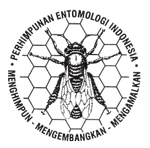Pengaruh samping aplikasi deltametrin terhadap Artropoda predator penghuni permukaan tanah di pertanaman kedelai
DOI:
https://doi.org/10.5994/jei.2.2.39Keywords:
Soybean field, predatory arthropods, pitfall trapsAbstract
Side Effects of Deltamethrin Application to The Ground Surface Dwelling Predatory Arthropods on Soybean Field. Side effects of deltamethrin to the ground surface dwelling predatory arthropods were studied on soybean field in Cianjur during July to October 1998. Insecticide was applied 1-4 times. Predator abundance was observed by setting pitfall traps. The results showed that application of deltamethrin reduced the abundance of ground-surface predatory arthropods, especially lycosid and linyphiid spiders, carabid beetle and formicid. Reductions of predator abundance on the plots treated with deltamethrin were around 35% to 41%. There was no significant difference on the predator abundance among the plots treated with the insecticide at difference frequencies. Observations after application showed that predator abundance on the treated plots recovered one week after application. Deltamethrin application to the soybean with dense crown (38 and 52 days after planting) did not reduce predator abundance, especially within three day range after application. However, negative effects of deltamethrin application at early vegetative growth stage (10 days after planting) on the reduction of predator abundance continued by harvesting. The abundance of detritivorous arthropods was not affected by deltamethrin application.
Downloads
Downloads
Published
How to Cite
Issue
Section
License
Authors who publish with this journal agree to the following terms:
- Authors retain copyright and grant the journal right of first publication with the work simultaneously licensed under a Creative Commons Attribution 4.0 International License that allows others to share the work with an acknowledgement of the work's authorship and initial publication in this journal.
- Authors are able to enter into separate, additional contractual arrangements for the non-exclusive distribution of the journal's published version of the work (e.g., post it to an institutional repository or publish it in a book), with an acknowledgement of its initial publication in this journal.
- Authors are permitted and encouraged to post their work online (e.g., in institutional repositories or on their website) prior to and during the submission process, as it can lead to productive exchanges, as well as earlier and greater citation of published work (See The Effect of Open Access).








